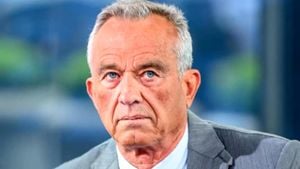Sri Lanka has recently witnessed seismic shifts in its political arena following the decisive victory of the National People’s Power (NPP) coalition, led by the newly elected President Anura Kumara Dissanayake. Harnessing the political momentum from the public’s discontent with the previous regime, the NPP’s sweeping electoral success marks Sri Lanka’s first substantial overhaul of governance since the chaotic economic crises of 2022 and the Rajapaksa family’s exit from power.
According to data from the Election Commission of Sri Lanka, the NPP captured 159 seats out of 225, amounting to 61.56 percent of the popular vote during the parliamentary elections. This victory signifies not only electoral success but also presents Dissanayake with the keys to enact numerous reforms, including constitutional amendments due to the supermajority secured. The win is particularly notable as it reflects the party’s ability to resonate with voters across various demographics and geographic locales, claiming the majority popular vote from 21 out of 22 electoral districts.
For example, the NPP triumphed even in traditionally strongholds such as Hambantota, where it garnered 66.38 percent of the vote—historically loyal to the Rajapaksa family. Similarly, they achieved significant support from the Tamil-speaking community in Matale and made notable gains in Jaffna, confronting previously dominant parties. This trend has led analysts to view it as indicative of the reshaping of political allegiance, highlighting the potential decline of identity-based politics which had previously defined Sri Lankan elections.
Despite Dissanayake's triumph, the NPP's victory raises as many questions as it answers—a sure indication of the complexity of governance the new party now faces. The challenges begin with the economic policies necessitated by the financial agreements made under the previous government, namely through the International Monetary Fund (IMF) bailout package which has been both praised for its necessity and critiqued for its stringent conditions.
Analysts are particularly wary of the ticking financial time bomb as the country sits within the framework of the 17th IMF program, which includes neoliberal tools such as governance-linked and macro-linked bonds. Critics note these approaches might eventually lead to increased fiscal pressure on the Sri Lankan populace. Historical grievances persist as past governmental actions led to the financial crisis; maintaining the faith of both the local population and international creditors poses additional tremors to the NPP’s ambitious plans for reform.
Dissanayake enters the presidency pledged to conduct independent debt sustainability assessments and aims to navigate the complicated financial arrangements left by his predecessors, and analysts suggest this approach may be fraught with difficulty. The president pledged to restore economic normalcy, but the execution of these reforms, especially ensuring they benefit those hardest hit by the economic downturn, looms as his primary test.
Public expectation is high after Dissanayake’s compelling mandate, yet he finds himself balancing the ideals of his political platform with the harsh realities imposed by economic conditions. Indeed, voters have expressed their desire for tangible change, one which reflects populist sentiments trending throughout the political schema of Sri Lanka—demanding improved economic conditions particularly for the underprivileged sectors of society.
With the backdrop of political violence including protests against the Rajapaksa administration, and subsequent economic distress which led to tight fiscal measures, voters are hoping the NPP will fulfill their promises of anti-corruption and pro-poor policies. The economic restoration, should it succeed, may also blend with promises of transparency and efforts to cleanse the political image tarnished by previous regimes.
Despite the clear mandate, the road ahead calls for astute governance, deftly maneuvering through vested interests entrenched within the political and business landscapes, which will likely resist the ambitious agenda outlined by the NPP. Dissanayake’s ability to balance these competing narratives—with populist promises, reformist zeal, and economic pragmatism—might well determine the fate of his government.
Meanwhile, the NPP coalition is marked by its eclectic nature, comprising both the traditional Marxist base of the Janatha Vimukthi Peramuna (JVP) and newer, younger political figures less grounded in the grassroots activism typical of the old party. This juxtaposition could lead to internal dynamic tensions within the coalition as various interests push for their agendas.
Pressure from traditional nationalist factions and residual support for the old political guard will continually challenge Dissanayake’s administration. Having taken the political reins of power, he must now pivot from external campaigning to addressing domestic needs, facilitating policies which both restore growth and respond to citizens' needs.
Internationally, external geopolitical pressures remain potent as Sri Lanka continues to navigate its commitments amid global financial interests, and community sentiment expresses wariness against perceived outside interventions. The incoming administration will need to cultivate diplomatic ties carefully, especially as previous agreements sought under past administrations remain contentious.
All eyes are on Dissanayake as he has made lofty promises—yet whether these translate to sustainable policy and economic recovery remains to be seen. The signing of the IMF agreement positioned Sri Lanka for emergency relief but also increased scrutiny on the administration’s financial dealings and governance practices.
The success of the NPP is not merely about winning seats but about establishing legitimacy and influence—a fundamental shift which will play out both regionally and internationally over the coming years. Given the historical precedents, the scope of Dissanayake’s vision will be tested against the harsh realities on the ground, where elevatory change hinges not only on policy updates but on fostering trust across multiple layers of governance and adaptations for real change.
A shift toward broader governance structures calls for unconditional unity, weaving together the many voices within Sri Lanka’s diverse society. Only time will reveal whether Dissanayake and the NPP can rise to these challenges and disappoint the anticipative weight of the electorate facing the consequences of the last decade’s turbulence. Dissenting political voices will either find coalition within the new governance paradigm or wrestle back control as the NPP settles onto the national stage.
For many, change is not quick nor easy, and as Sri Lanka embarks on this new chapter, the national psyche remains fragile, balancing hope with skepticism—a reality faced by many nations grappling for cohesion after years of disillusionment. The layering and nuance of Sri Lanka’s current political environment may very well dictate its future, with readers and observers alike eagerly awaiting the outcomes of this new political breed, the actualization of promises long awaited by the people of Sri Lanka.



